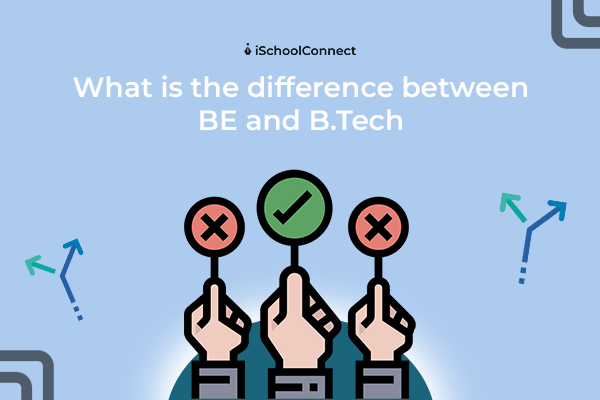Table of Contents
Difference between BE and Btech | What are they?
Engineering students pursue either a Bachelor of Technology (BTech) or a Bachelor of Engineering (BE) degree. While studying for one of these degree tracks, you can specialize in areas of interest and pick streams based on your career ambitions. While both degrees have the same professional significance, there are a few distinctions between a BTechfrom a BE degree. In this blog, we will look at the main differences between BTech and BE degrees.
The difference between BE and BTech degrees
There are several differences between a BTech and a BE degree. The BTech and BE degrees are both professional undergraduate degrees awarded to engineering students after four years of study. These degrees can be completed in three years if you have a diploma in engineering.
You can enroll in a four-year engineering degree program if you have completed your higher secondary or 12th-grade education. You can get your BTech or BE degree by completing entrance exams such as the Joint Entrance Examination (JEE), which defines the selection criteria for admission to top public universities. Private colleges, too, use a similar structure to identify competent students. Here are some additional distinctions to keep in mind.
Data-based vs. Skill-based

BE degrees are data-driven programs that place a greater emphasis on theoretical learning and training than on practical understanding. They also incorporate topics from other disciplines. A student seeking a BE in mechanical engineering, for example, may also study computer science. It entails learning the design, building, and operation of computer applications as well as the manufacturing, maintenance, and evaluation of mechanical systems.
Tech degrees are specialized programs. If you study civil engineering, for example, you could gain skills like planning, designing, constructing, and managing industrial growth. It also includes building and maintaining highways, roads, railway tracks, or metro lines.
Eligibility
If you wish to pursue a BTech degree, you must have completed your 12th grade with at least 50% marks in both physics and chemistry. You need to clear specific entrance exams and tests to apply to the program depending on the sort of university you wish to attend.
In the case of a BE degree, you must have passed your 12th grade with at least 50% marks in physics and chemistry. To be considered for admission to the BE program, you may be required to take certain entrance exams.
Training and Internships
Internships, industry visits, and training are all required if you wish to pursue a BTech degree. An internship is required for all BTech students at most engineering universities. Consider that you are a BTech student studying biotechnology and are interested in the marketing and administration of biotech products. In such a scenario, you can work as an intern in a biomolecular lab, where you will be able to focus on marketing strategies and efforts to expand the reach of its biotech goods.
In comparison to a BTech degree, the course structure for a BE degree is more customizable. Internships and industrial training are also required as part of the BE program but are not required. Assume you are a student pursuing a BE in biomedical engineering and are interested in monitoring and constructing medical devices for cancer patients. In such a situation, even though it is not part of your program, interning in a hospital or medical institution may benefit you.
Which is the better course, BTech or BE?

Students with a BTech or a BE degree have a wide range of career options. The choice between a BTech and a BE course is determined by the students’ individual professional needs, objectives, and preferences. When deciding on an engineering degree, consider whether your hobbies fit into skills- or knowledge-based degree.
A BE degree, for example, is preferable to a BTech degree if you want to study how system designs and computer applications operate. How they are used in hospitals for data processing, as well as the theoretical principles of system design in medical facilities.
A BTech degree, on the other hand, might be more appropriate if you wish to design genuine practical applications for medical data processing. It is skill-based and teaches you how to create computer programs for data analysis.
Job prospects
All universities and institutions hold placement drives for students in their last year of either degree. Getting a job through placements, especially before completing school, is a safe choice for students who want to gain the necessary exposure. The following are some career profiles that students can pursue regardless of their degree (BTech or BE).
Job opportunities following a BTech or BE course
- Professor
- Computer Programmer
- Engineering Support Specialist
- R&D Applications Engineer
- Academic Researcher
- Software Engineer
- Ergonomist
- Process Engineer
- Quality Engineer
- Industrial Manager
- Operations Analyst
- Management Engineer
- Plant Engineer
- Manufacturing Engineer
- Quality Control Technician
- Project Engineer
- Operations Manager
- Facilities Engineer
Key Takeaways
- BTech is a skill-based program, whereas BE is a knowledge-based one.
- Industrial visits and internships are required for BTech students. However, industrial trips and internships are essential but not required for BE students.
- In Btech, the emphasis is on actual applications rather than academic ones. The primary emphasis, on the other hand, is on grasping the principles and obtaining theoretical knowledge.
- Because the BE course is more skill-based and technology-oriented, it is often updated. Btech is more knowledge-based, and the course is not updated as regularly as the others.
- Typically, academic institutes that provide engineering courses refer to their degree as a BTech. BE is often offered by colleges that also offer other courses like humanities, arts, and so on, in addition to engineering.
Was this blog informative? If so, please share your thoughts in the comments below. Click here to reach out to us for more information on the differences between BE and BTech courses.
We would be happy to assist you with your queries!
Liked this blog? Read next: Most frequently asked civil engineering interview questions
FAQs
Q1. Which is harder, B.Sc. or BTech?
Answer – Because the courses in BTech are more technical, the examination structure is more difficult than in B.Sc. Furthermore, B.Sc. is a three-year degree program, but BTech. is a four-year degree program, so BTech is more in-depth.
Q2. Are B.Sc. and BE similar courses?
Answer – B.Sc. is a degree in a more theoretical area of science, whereas BE is an engineering discipline that concentrates on the subject’s principles.
Q5. Can I pursue an MTech after completing my BE?
Answer – Yes, you can pursue MTech after earning a BE/BTech degree with a qualifying GATE score.







